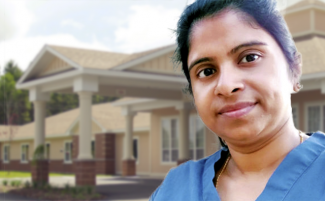COVID FODDER
Health care workers feel ‘sacrificed’ and ‘abandoned’ in Covid fight

Bipasha Mondol, health care aide
THEY SHOULD FEEL LIKE HEROES. But they don’t. The nurses, personal support workers (PSWs), custodians, cleaners and other health care workers on the frontline in the Covid fight in Ontario feel they are being callously “sacrificed”.
Fresh research finds that these workers know that they are at increased risk of infection due to lack of protection. Official inability to acknowledge or fix this threat results in “anger, frustration and a sense of violation”, write Dr. James Brophy and Dr. Margaret Keith, in their study Sacrificed: Ontario Healthcare Workers in the Time of COVID-19, published November 24.
91% feel abandoned
“The nurses, PSWs and custodians we did extensive interviews with felt they were being sacrificed by all levels of government that chose to water-down protections because of the lack of masks and other gear leaving them at greater risk of infection,” says Brophy.
The authors said that although frontline workers were at first applauded and termed “heroes,” the systemic flaws in the healthcare system leave them unsupported, vulnerable and sacrificed. Sixteen Ontario healthcare workers have died and 8,800 have contracted Covid-19 at work according to government statistics.
The study findings are based on a poll of 3000 health care workers carried out by the Ontario Council of Hospital Unions-Canadian Union of Public Employees (OCHU-CUPE). Deeper insight is provided by extensive interviews with 10 health care workers carried out by the two professors, who are affiliated with the University of Windsor.
About 91 per cent of those polled said they felt the government had abandoned them.
Women go from bad to worse
Dr. Keith also noted that the frontline health care workforce is predominantly female, disproportionately racialized and operates in a toxic environment with alarming levels of physical violence, sexual harassment and verbal abuse.
Compounding the problem is a hierarchical workplace culture where management marginalizes workers’ voices and threatens them with reprisals for speaking up.
“The residue for many of these female health care workers is that they feel violated and subjected to much higher risks than they should have been,” Keith said.
“We all need to pay attention to the pleas of health care workers during this frightening time. Not only does their wellbeing matter, we need to realize that if they are not kept safe and well, they can’t properly care for their patients and residents,” Keith said.
Study co-author Michael Hurley says that “the study findings lead to important recommendations:”
- raising staffing levels in hospitals and in long-term care
- legislated protection to allow staff to speak out about conditions at work without reprisal
- the urgent need to rebuild a regulatory system that has failed health care workers
- providing access to the protective equipment staff require to be safe
- greater support from management and access to mental health supports.
- 30 -













Add new comment